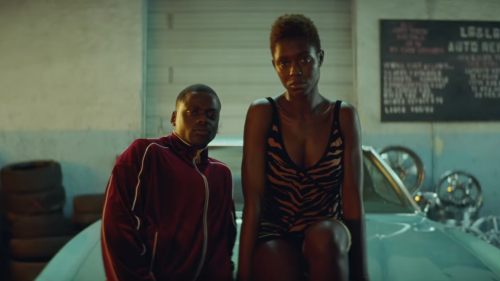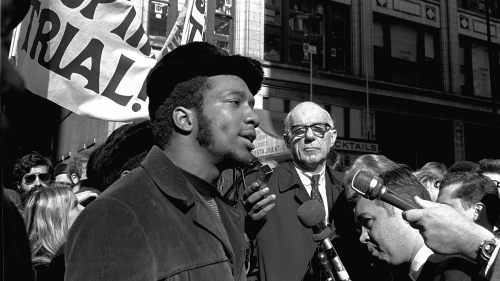QUEEN & SLIM Review: Trivial Pursuit
Outlaws are a cornerstone of American mythology. From Jesse James to Bonnie and Clyde, we love to retell stories about people who openly shirked the law and became folk figures in the process. But for Black people—who often achieve outlaw status for the mere act of existing—the narrative is a lot bleaker, with every day bringing a high potential for getting gunned down by cops and a low potential for getting folk songs sung about you as a result. The image of Bonnie Parker and Clyde Barrow going down in a hail of police bullets lives on in the collective memory, while the destruction of Amadou Diallo is largely forgotten.
Melina Matsoukas's Queen & Slim is a film that, commendably, wants to correct the disparities between the way we treat legendary white outlaws and the way we view Black people who’ve been outlawed. It takes an event that has become a routine tragedy on news and social media and spins it into an epic folktale, complete with two central figures who remain nameless yet manage to be influential with their every move. Unfortunately, Queen and Slim rarely get to be more than just “figures,” because the film wants so badly to inspire and impart meaning that it forgets to include interiority and nuance.
We’re introduced to Queen (Jodie Turner-Smith) and Slim (Daniel Kaluuya) during an unremarkable first date. It’s obvious from the jump that they don’t get along, which makes it all the more fitting that they’re forced to stay together for their own survival. Just when they were about to part ways, a chance encounter with an aggressive police officer causes them to kill said cop in self-defense, so then they have to go on the run to escape the death penalty. Their search for sanctuary sends them on an odyssey through the Deep South, where we see them interact with eccentric characters, evade the law, and inspire a movement. We also get to see the two bond, but the film doesn’t give us the same opportunity to bond with them.
Queen and Slim are both ciphers with plenty of informed character traits, but no real psychology to underpin them. Turner-Smith’s Queen is a stuck-up, yet tough social justice freedom fighter. We learn this not through her actions in movie, but through her own self-description. A big problem throughout Queen & Slim is that when the script wants you to know something about a character, it has that character say it aloud in no uncertain terms. It’s the kind of thing that would be permissible in an after school special, but not a cutting-edge drama with aspirations of updating Bonnie and Clyde and Badlands.
Kaluuya and Turner-Smith are both talented enough performers to make some chemistry shine through their overly snippy banter, but no amount of chemistry can dissolve the baffling dialogue they’ve been given. Queen & Slim’s script is grasping for profundity with every other word, to the point that characters will introduce themselves in one line then give an ontological thesis in the next. The fact these characters are bouncing monologues off each other rather than talking like people is even more perplexing when you consider screenwriter Lena Waithe’s stacked bona fides elsewhere.
My running theory over the first half of the film was that Queen & Slim was an absurdist dark comedy, hence why so many characters evoke arch stereotypes, and why the tension surrounding the chase feels so deflated. But it’s not that the movie is trying to be funny; it’s that way too much of it happens off-screen. Queen & Slim relies on implied action and expository backstory, so several emotional beats aren’t given the appropriate context to feel as meaningful as the film wants them to be. The stakes of Queen and Slim’s pursuit aren’t felt because we’re rarely given a window into how the police are hunting for them. Even the folk legend that’s growing around them is cordoned off to throwaway lines and doesn’t seem to affect the main characters’ growth.
For a film that’s allegedly about uplifting the Black Lives Matter movement, Queen & Slim spends a weird amount of time generating sympathy for the police. With the exception of the short-tempered profiler who incites the plot, the police characters in Queen & Slim are repeatedly shown to be decent, reasonable family men who are doing the best they can do to keep everyone safe. In one scene, an officer helps our central duo escape. A different officer calmly tries to save a young Black boy during a chaotic protest. Yet another officer tearfully apologizes for the actions of his “bad apple” colleague and forgives the main characters sight unseen for acting in self-defense. The convenience of all these scenes and more makes it clear that Queen & Slim is disinterested in interrogating systemic racism and policing as institutions.
Queen & Slim is a film that almost works as a transgressive exercise in absurdity—a modern descendant of Sweet Sweetback’s Baadassss Song—but its folktale style too often loops around into status quo-reaffirming moralizing. The movie is so convinced about making its star couple inspiration figures that it neglects to humanize them. At worst, Queen & Slim equates Black freedom to martyrdom, and I think that ascribes way too much meaning to all the meaningless death that’s resulted from police violence.
The thing about Bonnie and Clyde was that Bonnie and Clyde were real people before they were folk heroes. Queen and Slim are not, and the film does little to prove that they are.



